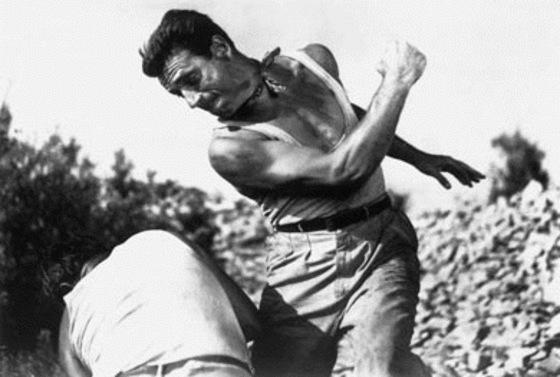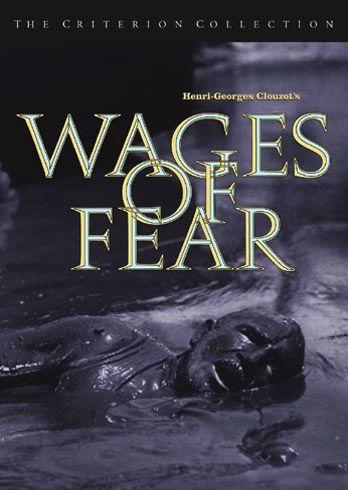Despite being a French movie from the early 50's, The Wages of Fear laid down the blueprint for high-concept action, and nary a blockbuster from Die Hard to Armageddon has escaped its influence or surpassed its mastery. It concerns a voyage from one point to another, with obstacles along the way to be overcome: the formula distilled to its essence.
A 45 minute prologue introduces us to a destitute village somewhere in South America. Undesirables have accumulated here from all over the globe, eroding any visible native character the place might have had; this is where you end up when you've screwed your chances everywhere else. The forces of American globalization are here as well, with the monolithic Southern Oil Company's local operations leeching meager scraps of exploitation as they may. Everybody speaks a different language and distrusts one another, but we see that they have formed a tenuous community based on their mutual desperation and wish to escape this wasteland.
When the S.O.C. sends word that they are offering an exorbitant amount of money for men to perform "dangerous work," it's no surprise that the residents turn out in droves to get the dough. Apparently, one of their oil fields has caught on fire, and will continue burning uselessly until a great enough explosion can be used to extinguish the flames. Trouble is, all of the S.o.C.'s highly explosive nitroglycerin is at their base near the village, the oil field is 200 miles away, and they lack the proper equipment to transport it.
So two ordinary trucks (they don't even have shock absorbers, mind you) are loaded up with tons of this nitroglycerin, and four desperate rejects are hired to haul the substance across treacherous roads to the oil field. Since the nitro will explode if the temperature changes by a few degrees or if they experience any jarring bumps on the road, the S.O.C. reckons each truck has a 50/50 chance of success. However, they have plenty of trucks and nitro, and no obligation to pay anybody who blows up on the way.
It's hard to adequately express the brilliance of this setup. Whereas the increasingly dominant strategy in the arena of action cinema has been to throw more explosions and more chaos in the face of the viewer, Wages of Fear lets you know right off the bat that almost ANY motion whatsoever will result in game over.
After building tense alliances and delicate rivalries over the course of the first act, our four lucky truck drivers are privy to a sublime moment of dawning terror as they watch the kegs of nitro as they are loaded onto the trucks up thin, rickety planks of wood. One truckloader missteps, and teeters for a moment as he regains his balance; simultaneously, the acute suspense causes one of the onlookers looses his grip on the drink he is holding. It's one of those supremely synchronized instances in which everybody onscreen and everybody watching is feeling the exact same thing: namely, that these four unfortunates are completely screwed.
The use of two trucks and four drivers quite confounds our ability to predict the course of events. Even if this was a Hollywood blockbuster and we could rely on at least ONE of the trucks making it, which one would it be? Throughout the voyage, the film continues to reinvent the physical predicaments it can visit upon its victims (this goes FAR beyond bumpy roads), much to their white-knuckled despair, and the viewer's heart-pounding delight.
Yet, in spite of all this, the real fireworks occur when the thin shells of heroism and courage that these misfits have constructed around themselves begin to peel away, revealing the festering cowardice and selfishness of their true nature. Upon repeated viewings, the first act is surprisingly gaudy and theatrical when compared to the stripped down brutality of the film's meat and bones, growing increasingly purposeful as it goes on. Meting out cause and effect with merciless precision, The Wages of Fear is an utterly bleak masterpiece, unparalleled in its manipulations of physical suspense.



